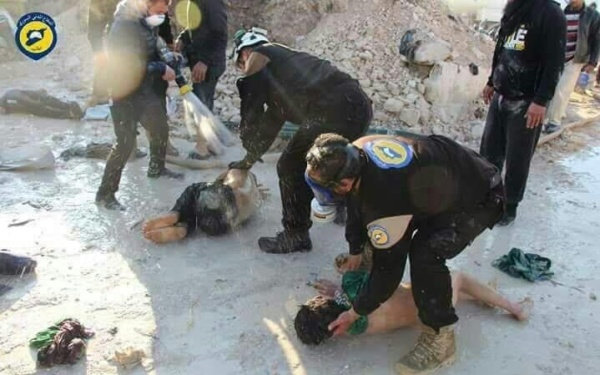White Helmets rescuers treat victims of the Assad regime’s sarin attack on Khan Sheikhoun in northwest Syria, April 4, 2017
A senior UN official has told the Security Council that the Assad regime — having carried out more than 300 chemical attacks in its deadly repression of mass protests since 2013 — is still not fully cooperating over the shutdown of its chemical facilities and weapons programs.
Adedeji Ebo, the Director and Deputy to the UN High Representative for Disarmament Affairs, said there has been some progress on Syria’s outstanding issues. However, he noted that Damascus’ declaration on its chemical weapon stockpiles is not accurate and complete.
Ebo said the declarations has unresolved gaps, inconsistencies, and discrepancies found in assessments by the Organization for the Prohibition of Chemical Weapons.
Since it was mandated in 2014 to investigate the chemical attacks — months after the Assad regime killed at least 1,400 civilians with sarin near Damascus — the OPCW has formally concluded that the Assad regime is responsible for a series of assaults. They include the killing of about 90 people and wounding of hundreds in Khan Sheikhoun in northwest Syria in an April 2017 sarin attack, and of 43 with chlorine in Douma near Damascus in April 2018.
See also OPCW Formally Blames Syria’s Assad Regime for Douma Chlorine Attack Killing 43 Civilians
On February 22, the OPCW found “reasonable grounds” that the Islmaic State deployed sulphur mustard gas during attacks in northern Syria in September 2015.
“The abSesence of accountability for the use of chemical weapons continues to be a threat to international peace and security,” Ebo emphasized, urging the Council to unite on the issue.
A series of delegations supported the OPCW’s work and urged the Assad regime to resolve the outstanding issues. The Japanese representative summarized, “It is our shared responsibility to hold accountable those who have used chemical weapons and bring justice to the victims,” strongly opposing any attempt to undermine the OPCW investigation.
If the Syrian chemical dossier remains at the very core of the #OPCW concerns, more than 9 years after Syria's accession to the Convention, it is precisely because chemical weapons have continued being used by one of its Member States.
— France aux Pays-Bas (@FranceinNL) November 29, 2021
The Assad regime’s ambassador insisted that it had fulfilled its obligations with the destruction of its entire chemical stockpile. Russia, the essential backer of the regime throughout its repression of protests, blustered that the OPCW is a platform for Western countries to “advance their narrow mercantile interests”. The delegate of Iran, which has also propped up Assad, declaring that the application of the Chemical Weapons Convention had been “politicized”.

